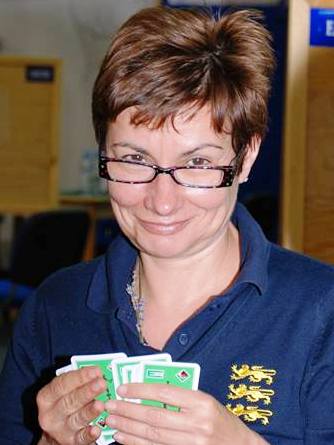


(Click here if you'd like to read Part 1 first)

A simple overcall is one of the most common actions that we take after opponents open the bidding. Though these bids are frequently used, they are not our best bidding tools because they are ambiguous in terms of their shape and strength (bids like 1NT overcalls or weak jump overcalls are better defined competitive actions and often make partner’s bidding easier).
A simple overcall can be used for a variety of different reason:
No matter what our goal is for making an overcall, we must consider the risks of making an overcall – every action comes with risk and reward. The optimist in each of us takes an action and hopes / expects that we’ll accomplish our goal. The pessimist in each of us should consider the bad things that could happen when we act – what to fear!
A simple overcall can get us into trouble. Let’s look at the bad things that can happen when we act with a less than a perfect hand:
But the biggest overcall disasters occur when we make a simple overcall and find our left-hand opponent has a decent hand and length and strength in our suit.
It’s dangerous to make a 2-level overcall on a hand like this (say the opponents open 1♠ and we overcall 2♦). Imagine if Responder is sitting behind us with a hand like this one?
Here we may end up losing a lot of tricks. This could be very expensive if the auction were to go:
If Responder has the discipline to make a trap pass and is fortunate enough to hear their partner reopen with a takeout double they can convert it to penalty and punish us for making such a bad 2-level overcall!
The main thing to remember from all of this is that overcalls are a frequent and useful part of competitive bidding. We use them to accomplish a variety of different goals. But they do come with several different risks, and we should work hard to measure the risk vs. the reward of our actions in different positions and vulnerabilities.
About the Author
Robert is a professional player and teacher who you’ll find all over North America (and the world). He's the founder of Adventures in Bridge and you'll find him hosting events, either virtual or in-person, almost every week of the year! Robert's also the president of the ACBL Educational Foundation where he's working to build an institution to shepherd the long term good of bridge!




Mike Lawrence explained all this 40 or 50 years ago in The perfect book of Overcall 🙂
Very useful tips, thanks Robert!
Has partner passed or not. Another factor to consider.
Good articles - covering all the variables clearly.
A concise and sage post; thank you for sharing your insight!
Loved the article and had never heard the phrase 'death score'...I love it and am going to plagiarize and write about it in my local newsletter
Thank you, Robert, for taking time to share your knowledge and experience with us.
PS: to readers, a" thank you," in addition to other comments will be NICE
I don't follow. This article only makes sense if the hand labeled Nord is actually West
Yes. If the first hand is North, the second hand is West.
If the first hand is North, the second hand is East. We play clockwise.
My rule of thumb is with the correct points level count the number of cards in the suit and add the number of honours in that suit and overcall to that level. It works most of the time.
I would agree with anonymous
Yr mail Mar 28: what should I understand by the "correct points level"?
If one has opening hand why not double???
depends on shape of hand in relation to opening bid{s}
My problem is coping with an overall of my, weak 1nt! I assume the overcaller has a 6 card suit and some 10 points.
Who should take action?
partner knows what you have, its up to him
Dbl = stolen bid. P could be weak or trap. 2 lvl Q shows stop, 3 lvl Q asks for stop.
Don't think one will get into trouble with the 1 diamond overcall because responder will probably not bid with 12 cards.
good spot . atrick some teachers use with beginners to make sure they count their cards!
Must have one up his or her sleeve...
Very observant ?
Not only a card short - also wrongly labelled as North
An article with much wisdom.
Might add: its rumored that
one in four MP results swing largely
on the opening lead.
So, overcalls on Jxxxx can fry the
defence when pard lead their Ax or Kx,
Also, going for an occasional large number is OK
at MP if one gets about two tops for each bottom.
But at IMPs it only takes one large set to loose the
match.
Many players can not shift their game from
IMPs to MPs.
One place it shows up is in their use of overcalls.
cccccttttt
What’s an IMP or MP? Not familiar with the acronym
MP is for Match Points
IMP for International Match Points